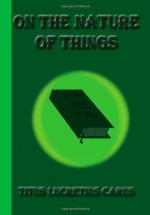|
This section contains 4,585 words (approx. 12 pages at 400 words per page) |

|
For Lucretius' contemporary Cicero, superstitio is the groundless fear of the gods, while religio is the pious worship of them. Elsewhere he de.nes religio in practical terms by cultus deorum instead of a set of doctrinal statements. Whereas the exact nature of the gods remained nebulous, every Roman knew his or her duty regarding the traditional rituals that constituted religio. Religio meant fulfilling an understood contractual relationship with the gods. It involved acts, rather than beliefs; it centered on cult, instead of theology.
Therefore, when in the following passage Lucretius inveighed against the outward modes of worship, he struck at the heart of religion as the Romans knew it: few could have appreciated, as their primary expression of religion, the emphasis he was putting on meditation:
nec pietas ullast velatum saepe videri vertier ad lapidem
atque omnis accedere ad aras, nec procumbere humi
prostratum et pandere...
|
This section contains 4,585 words (approx. 12 pages at 400 words per page) |

|




